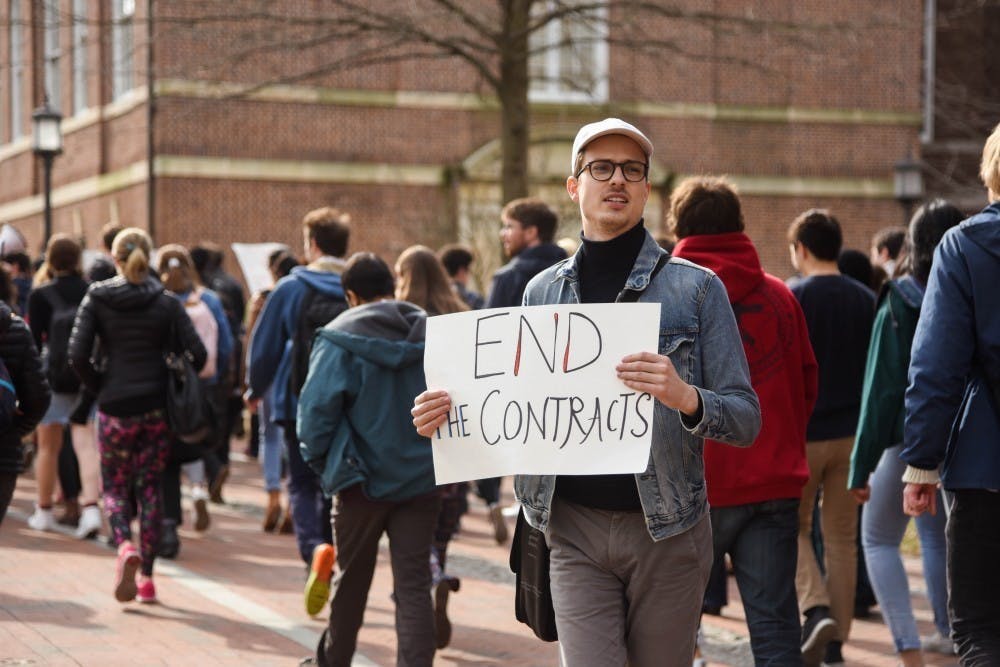The Hopkins School of Medicine confirmed on Sept. 18 that it would be ending its controversial training contract with Immigration and Customs Enforcement (ICE). This contract was held through the Center for Law Enforcement Medicine. However, at the time, some students questioned the accuracy and implications of this announcement.
The News-Letter reached out to University officials to discuss the rationale behind choosing not to renew the contracts on Monday.
According to Hopkins Medicine Senior Director of Public Relations and Corporate Communications Kim Hoppe, the decision stemmed from administrative issues.
“Decisions about whether to seek and renew contracts depend on a multitude of factors,” Hoppe wrote in an email to The News-Letter. “In this case, due to complications related to the contracting process, including some delays in notification by the agency regarding its intentions, the Department of Emergency Medicine had to reallocate the substantial resources required to manage the program to other unrelated departmental activities.”
Conor Bean, a member of the Hopkins Coalition Against ICE (HCAI) and a graduate student studying Political Science, stated that HCAI’s work would not end with the expiration of the contracts.
“Obviously ICE as an institution didn’t falter with this contract ending, so there’s still a lot of work to be done and there’s still a very large national movement that we can continue to relate to,” Bean said.
Last spring, student protesters occupied Garland Hall in order to condemn the establishment of a Hopkins private police force, as well as the impending renewal of the University’s contracts with ICE.
Hoppe did not address whether these protests had impacted the University’s decision.
“The decision... stemmed from internal considerations regarding the resources required to maintain the program and other departmental priorities,” she wrote.
However, Bean rejected this explanation in an email to The News-Letter.
“It’s ludicrous to say that this is purely administrative, these contracts have gone on for several years and the year there is a massive uptick in protest locally and nationally against ICE, this falls through,“ Bean wrote.
The movement known as #AbolishICE began on Twitter in February 2017, but achieved new prominence as it was picked up as an issue by some high-profile candidates in the 2018 midterm elections.
The Hopkins School of Education also has an ongoing training contract with ICE as part of their Public Safety Leadership program. Karen Lancaster, assistant vice president of external relations for the office of communications, confirmed via email that this contract would be allowed to expire without being renewed.
“[T]hat contract expires in 2019, and the Public Safety Leadership program as a whole is being wound down,” Lancaster wrote.
The website for the Public Safety Leadership program shows that both of its courses of study stopped accepting new applicants in December 2017 and is slated to be shut down when the currently enrolled students earn their degrees or otherwise leave the program.
Separately, staff worker and member of HCAI Nicholette Stachowiak stated that she had recently discovered the existence of Customs and Border Protection (CBP) contracts with the University.
“Hopkins has in the past had contracts with Border Patrol and that part we knew. Initially we thought they all ended in 2013, 2014. But this past week I went through just to double-check when the exact dates were for that last contract with CBP and I found that the database had been updated since the end of last semester,” Stachowiak said. “I found that there was actually a five-year contract for over $65 million between CBP and Hopkins that ended two days ago.”
Stachowiak condemned the University for using progressive language in what she believes is only an effort to create a front.
“Hopkins is complicit in these white supremacist machinations, but they’re hiding behind progressive language,” she said. “They’re hiding behind the reputation of their brand name and their medical institution.”
Earlier this week, Bean told The News-Letter that he believed that the University administration had modified the student code of conduct last May so as to directly threaten international students.
“This thing changed in the middle of the night with nobody knowing. They didn’t feel any need to promulgate it at all to tell everybody that the rules were changing under their feet,” Bean said. “The explicit reference to immigration status is hard not to read as direct intimidation, especially given the amount of students who have migrated from other countries who were a huge part of the activism on campus last year.”
Bean provided to The News-Letter screenshots from the Web Archive pages from July 23, 2018 and May 10, 2019, which purported to show updated language on the Student Code of Conduct website. However, when The News-Letter conducted a further investigation of this claim, it became clear that such language was actually moved from one location on the webpage to a different location.
In an email, Lancaster confirmed that no change in the actual policy had occurred.
“There have been no changes to student conduct policy or language,” Lancaster wrote. “This is longstanding language in the student conduct code and other disciplinary communications which serve as a reminder that student status, including visa status for international students, can be affected by student conduct code violations.”
When updated with The News-Letter’s findings, Bean said that HCAI’s concerns were not fully addressed.
“We are also concerned with the opacity of how the school decides to present the code of conduct online, how it wields its discretion to discipline students, and why there isn’t faculty or student input on the code of conduct and its publication in general,” he said. “One thing that we’ve always been interested in, on the campus front, is trying to hold the University accountable to at least be public and direct in terms of how it’s governing itself and attempting to govern students.”





